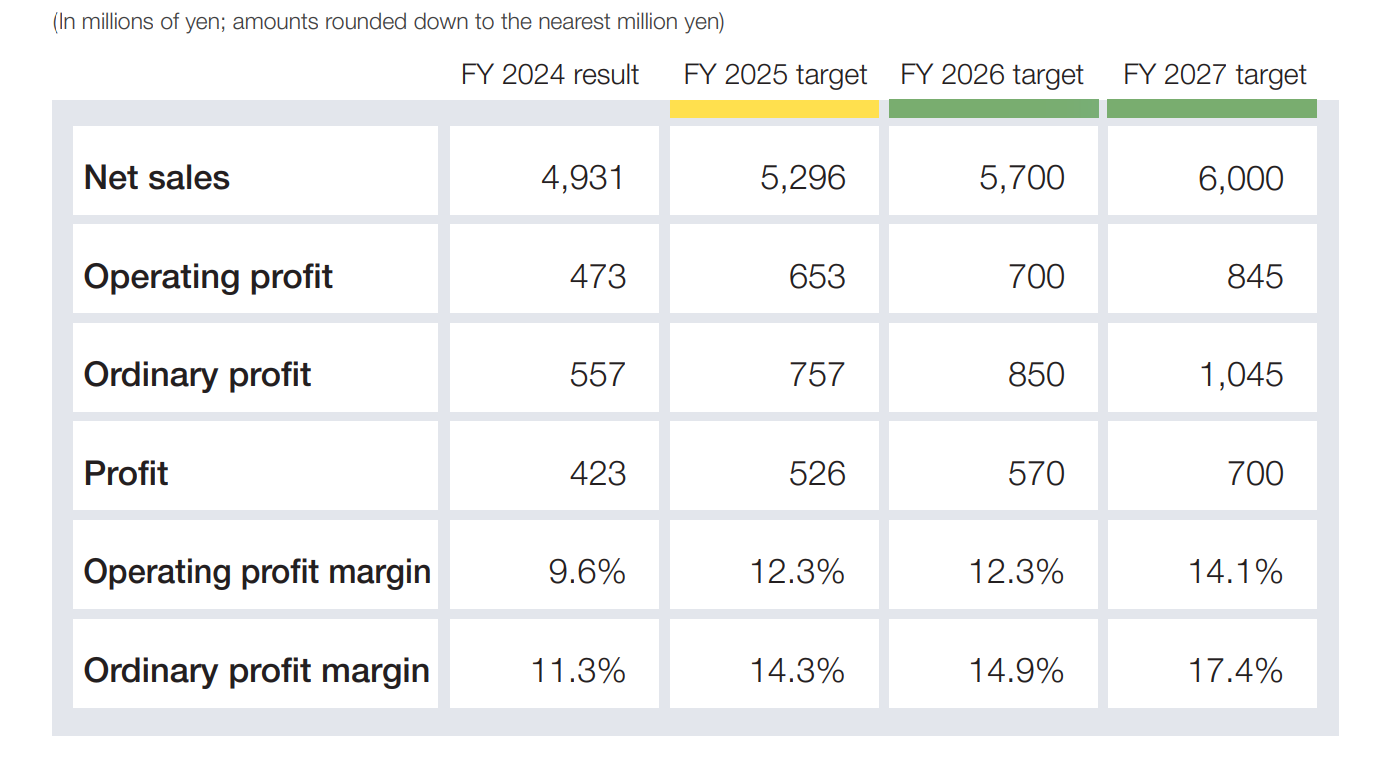Business Vision: "AMITA Vision 2030"
The AMITA Group has established "AMITA Vision 2030" as our business vision to realize our mission. This vision aims to establish an ecosystem society through our Social Circular Platform—a mechanism that connects people, resources, and information within communities. Built on a foundation of rich relationships, we are working to realize a society where people, nature, tangibles, and information are all interconnected, maintaining overall optimization through continuous cycles of metabolism and transformation, much like a natural ecosystem. (For more details on our vision, click here)
Table of Contents
Six-Year Management Plan for FY 2025-2030
The AMITA Group positions FY 2025 as the final year of the Groundwork Phase in our Six-Year Management Plan, strengthening our business foundation in preparation for the Business Expansion Phase.
From FY 2026 onward, we will enter the Business Expansion Phase and subsequently the Accelerated Business Growth Phase, enhancing our ordinary profit margin and attaining sustainable growth to achieve consolidated net sales of 8.7 billion yen in FY 2030.

Three-Year Management Plan for FY 2025-2027

*Note: To respond flexibly to changes in the business environment, we formulate our three-year plan using a rolling basis with annual revisions.
Six Key Business Strategies to Achieve Our Business Objectives for 2030
To achieve our Six-Year Management Plan and AMITA Vision 2030, we are strengthening the profitability of our existing businesses, expanding into international markets, and launching new businesses to develop a circular market in Japan.
Strengthening Existing Businesses
1. Cyano Project: Corporate Sustainability Support
- Expand the scope and scale of the Cyano Project service suite through strategic partnerships with companies across diverse industries
- Achieve stable revenue through continuous project implementation with corporate clients
- Strengthen sales capabilities by implementing our proprietary inbound marketing strategy
2. Manufacturing and Supply of Circular Materials
- Reduce manufacturing costs through fully automated production of circular materials
- Enhance customer responsiveness through operational efficiency and AI technology
- Optimize circular supply chains through the development and implementation of information management systems
3. Environmental Assessment and Certification Service
- Strengthen the service infrastructure by expanding our team of assessors and implementing DX solutions for administrative processes
- Expand into international markets, including Malaysia and other ASEAN countries
- Increase revenue by expanding the scope of certification service offerings
4. Business Operations outside Japan
- Generate enhanced value through collaboration with local business partners to share knowledge and networks and diversify investment risks
- Reduce business development costs and risks by leveraging Japanese government-sponsored public-private partnership schemes
- Build a profitable business foundation through step-by-step implementation of circular solutions in ASEAN markets
Developing New Businesses
5. MEGURU STYLE: Comprehensive Solutions for Community Sustainability
- Develop a prototype of MEGURU STYLE through field tests in pilot communities
- Design a standardized model in preparation for the nationwide launch of MEGURU STYLE
- Establish mechanisms for stable revenue from municipalities and businesses
6. IoE-Enabled Business Development
- Develop an AI-assisted information-gathering system at MEGURU STATION® and establish a scheme to effectively use the gathered information
- Quantify the social value generated by MEGURU STYLE
- Seek corporate partners
Key Initiatives for FY 2025
As the final year of the Groundwork Phase, we will complete preparations for the Business Expansion Phase beginning in FY 2026 by focusing on "Strategic Partnerships" and "Three Key Growth Drivers."
Strategic Partnerships
- Establish a five-party alliance to jointly promote innovative corporate sustainability solutions
- Collaborate with Kameoka, Kyoto, to develop the MEGURU STYLE service suite
- Collaborate with local partners in Indonesia and Malaysia to expand our business operations in those countries
Three Key Growth Drivers
Compelling value propositions of our service products
- Launching Circular Co-Evolution: a five-company alliance delivering integrated corporate sustainability solutions
- Develop and test Neo-Cyano Project: AMITA's sustainability service suite for circular economy, carbon neutrality, and nature positivity
- Develop and test MEGURU STYLE: a community design service to realize a community-based circular economy, with prototyping and standardization for rollout
Sales and Marketing Excellence
- Refresh our company information website
- Hold sales and corporate management seminars for business managers
ー For business leaders and executives: A four-part seminar on the risks and opportunities that arise from navigating today's unpredictable operating environment
ー For practitioners: A three-part seminar on sustainability solutions - Establish a business leadership community to foster dialogue and value creation
Organizational Excellence
- Enhance the effectiveness of the OKR (Objectives and Key Results) performance management framework
- Invest in and implement DX solutions throughout the organization
- Enhance employees' team-building and hypothetical thinking skills
For More Information
For more details on our business vision and strategies, please refer to our Annual Report 2024 "Creating Value, The AMITA Way." The latest financial performance information is available on our "Financial Highlights" page.


